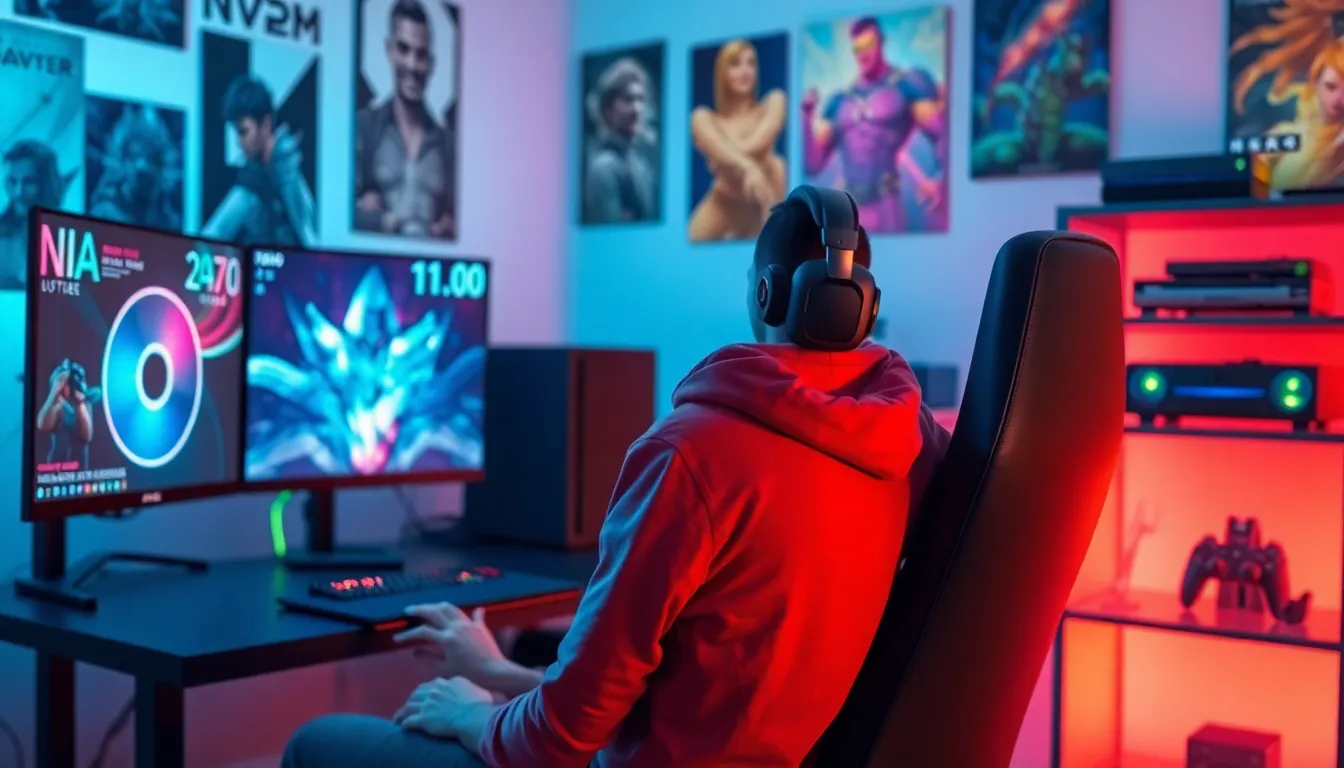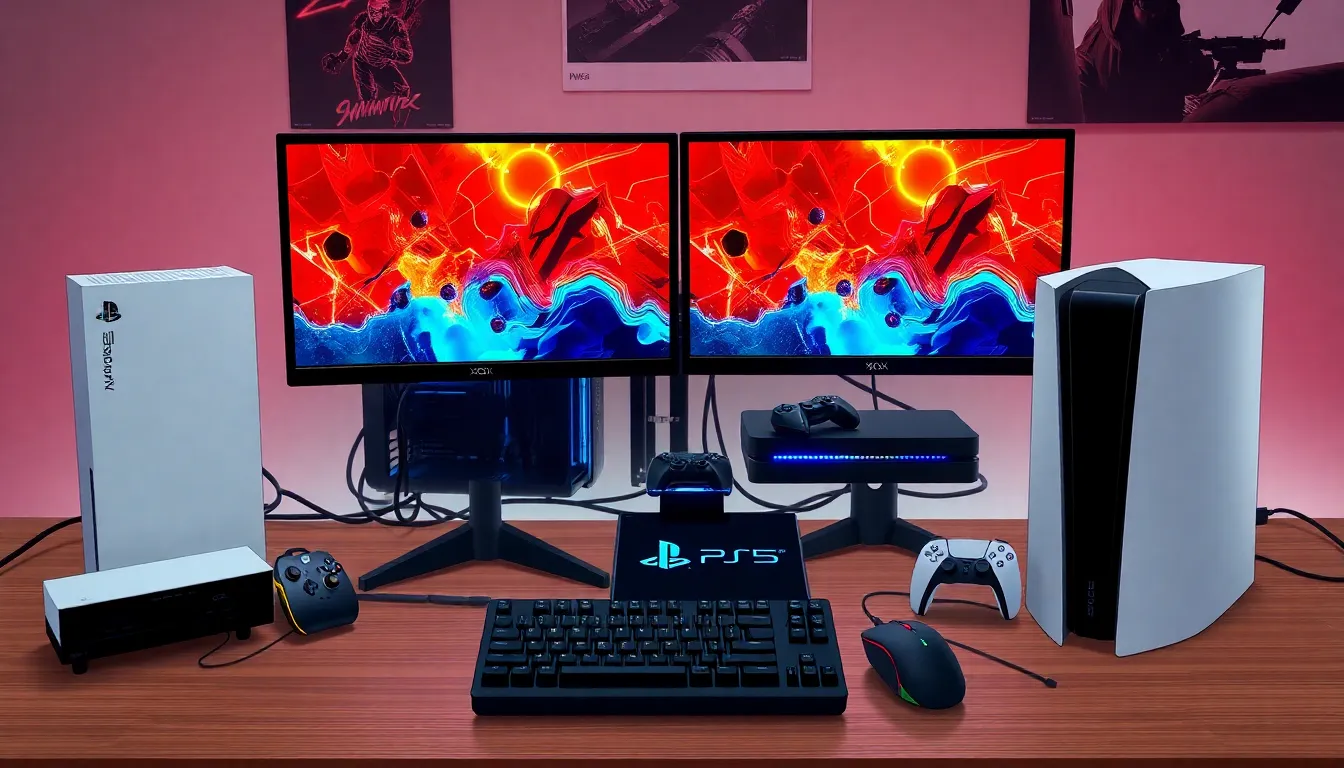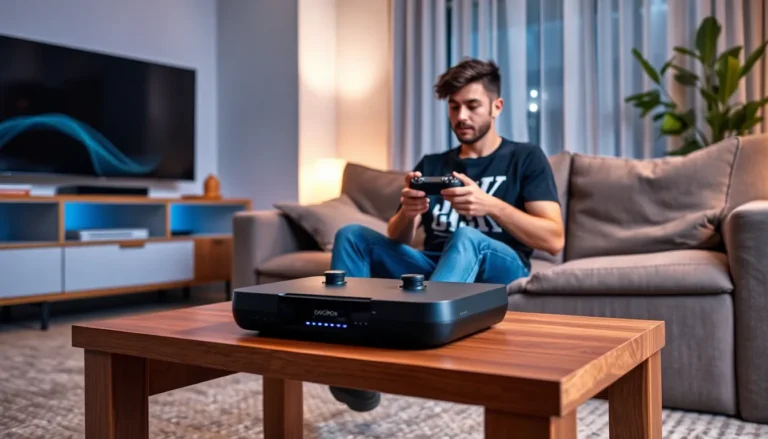
PC vs Console Gaming: Which Platform Reigns Supreme in 2023?
In the epic showdown of PC vs console gaming, the battle lines are drawn and the stakes are high. Gamers everywhere find themselves caught in a delightful tug-of-war, debating which platform reigns supreme. Is it the sleek power of a custom-built PC, ready to unleash stunning graphics and lightning-fast performance? Or is it the simplicity and charm of consoles, inviting players to jump straight into the action without the hassle of upgrades?
PC VS Console Gaming
PC gaming offers powerful performance and customization options. Gamers can build or upgrade their systems to achieve high frame rates and stunning graphics. Key components like graphics cards and processors significantly contribute to the gaming experience.
Consoles, on the other hand, emphasize user-friendliness and accessibility. Players can easily pick up a console and start gaming immediately without complicated setups. Exclusive titles, often available only on consoles, attract a loyal audience.
Cost considerations also play a crucial role in this debate. A high-end gaming PC often entails substantial upfront expenses, while consoles typically have lower initial prices. Monthly subscriptions are common for online multiplayer modes on consoles.
Community features differ between the two. PC platforms often provide robust modding options, which enable players to customize games extensively. Console systems usually foster tighter-knit gaming communities through shared experiences and platform-exclusive features.
Cross-platform play is emerging as a noteworthy trend. Gamers can now connect with friends across different systems, blurring the lines between PC and console gaming.
Ultimately, preferences hinge on individual priorities, such as graphics fidelity, ease of access, and gaming library diversity. Each platform presents unique advantages, catering to distinct gaming styles and habits, leading to an evolving playing field.
Performance Comparison

Performance significantly varies between PC and console gaming, impacting player experience. Distinct advantages exist for each platform.
Graphics Quality
PCs typically offer superior graphics quality, providing higher resolutions and advanced settings. Gamers can customize graphical settings, leading to stunning visuals. A high-end PC can push 4K resolution and utilize ray tracing for lifelike lighting effects. Consoles, while capable of impressive graphics, often run games at fixed settings. Major titles on consoles might reach 4K but at a lower frame rate compared to PCs. For example, the PlayStation 5 and Xbox Series X excel in delivering beautiful graphics, yet they can’t match the flexibility of a well-equipped gaming PC.
Frame Rates
Frame rates often showcase the performance gap between PCs and consoles. PCs can exceed 60 frames per second, providing smoother gameplay. Custom-built systems with powerful GPUs achieve up to 240 frames per second in competitive titles. Consoles, such as the PlayStation 5 and Xbox Series X, target 60 frames per second but may drop in demanding scenarios. Gamers focused on competitive play benefit from the higher frame rates of PCs, enhancing reactions and overall immersion. While consoles offer a solid experience, the frame rate potential of PCs clearly stands out to performance-driven players.
Cost Analysis
Cost considerations play a significant role in the ongoing debate between PC and console gaming. Analyzing expenses aids in understanding the commitment required for both platforms.
Initial Investment
Initial investment varies greatly between gaming PCs and consoles. High-end gaming PCs often demand substantial upfront costs, typically ranging from $800 to over $2,000 depending on specifications. Customization options further inflate these prices, allowing for powerful components that enhance performance. In contrast, consoles such as the PlayStation 5 or Xbox Series X generally retail for around $500, making them more accessible. Budget buyers find consoles particularly attractive since they offer a ready-to-use system without requiring additional purchases.
Ongoing Costs
Ongoing costs also differ significantly. PC gamers face expenses like hardware upgrades, which may occur every few years. Components like graphics cards and RAM can cost hundreds, necessitating financial planning for continuous enhancements. Furthermore, subscription services for online play or additional game libraries often contribute to annual costs. Conversely, console users usually encounter fewer upgrade requirements, thanks to stable hardware performance. Game purchases on consoles often cost around $60 each, similar to PC games. Yet, services like Xbox Game Pass provide excellent value, offering access to a library of titles for a monthly fee.
Game Library Diversity
Game library diversity highlights the range of games available across platforms, a key consideration for gamers.
Exclusive Titles
Consoles often feature exclusive titles that aren’t available on PCs. Iconic franchises like “Halo” and “The Last of Us” attract players to specific consoles, providing experiences tailored to that hardware. PC gaming boasts its own collection of exclusives, such as “Dota 2” and “Counter-Strike: Global Offensive.” These games frequently showcase the power of PC performance and modding capabilities. Many gamers choose their platform based on the exclusives they are passionate about. While this can influence purchasing decisions, each platform’s unique offerings enhance gameplay experiences.
Availability of Genres
A wide variety of genres thrive on both PC and consoles. Action, adventure, role-playing and simulation games often dominate both platforms. PC gaming maintains a stronghold in simulation and strategy genres, hosting popular titles like “Civilization VI” and “The Sims.” Consoles excel in providing action-packed experiences, catering to players with franchises like “Call of Duty” and “Assassin’s Creed.” Each platform supports niche genres with dedicated fan bases, enriching gaming culture. Gamers often explore features and gameplay mechanics within those genres that pique their interest, further diversifying the gaming landscape.
User Experience
User experience varies significantly between PC and console gaming, influencing player engagement and satisfaction levels.
Customization Options
Customization options play a crucial role in enhancing player experience on PCs. Gamers can upgrade components such as graphics cards, RAM, and processors, allowing them to tailor performance to specific needs. Extensive modding capabilities enable players to modify game content and mechanics, offering a unique experience. In contrast, consoles typically offer limited customization, focusing on consistency and ease of use. Players can personalize settings within games, but hardware upgrades are generally not an option. For those who prefer standardized experiences, consoles appeal due to their simplicity.
Controller vs Keyboard and Mouse
Controller and keyboard and mouse setups dictate gameplay style and comfort. Console gamers primarily use controllers, designed for easy handling and ergonomics. Buttons and triggers facilitate intuitive controls, enhancing accessibility. Keyboard and mouse setups dominate PC gaming, allowing for precision and speed in competitive scenarios. Many players find aiming and movement more fluid with a mouse compared to a joystick. Each option has its strengths, catering to different preferences and gameplay experiences. Gamers often choose their platform based on these input methods, influencing overall satisfaction.
Conclusion
The debate between PC and console gaming continues to evolve as technology advances and player preferences shift. Each platform offers unique advantages that cater to different gaming styles and experiences. Whether it’s the high-performance capabilities of PCs or the accessibility and community focus of consoles, gamers have plenty of options to choose from.
Ultimately, the best choice depends on individual priorities. Factors like graphics quality, ease of access, and exclusive game libraries play significant roles in shaping decisions. As the gaming landscape continues to change, players can enjoy the benefits of both worlds, fostering a vibrant and diverse gaming community.



